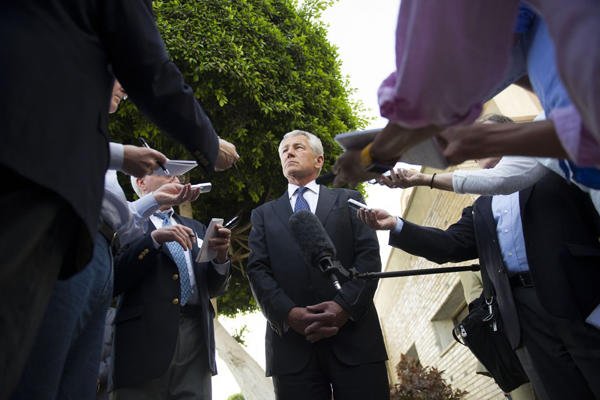The Obama administration said Thursday that U.S. intelligence agencies have "varying degrees of confidence" the Syrian regime has used chemical weapons against civilians – a "red line" President Obama has said would cause the U.S. to increase its military involvement.
Defense Secretary Chuck Hagel said Thursday morning that the U.S. intelligence community believes it has evidence the Assad regime has used sarin gas against civilians in the Syrian president's fight against the rebel opposition.
In March, President Obama said the U.S. "will not tolerate the use of chemical weapons against the Syrian people, or the transfer of those weapons to terrorists." The White House director of legislative affairs issued a letter Thursday to Senators Carl Levin and John McCain, the chair and ranking member of the Senate Armed Services Committee, confirming the U.S. intelligence assessment that Assad used chemical weapons.
However, the White House is not convinced the red line has been crossed as President Obama has requested a United Nations investigation to "establish the facts," according to the letter written by Miguel Rodriguez.
What's in question is whether the U.S. can prove the chemical weapons belonged to Assad's regime. The Obama administration said "physiological samples" exist proving the use of sarin, a chemical agent that attacks a human nervous system. Neither Hagel, nor the White House letter specified the source of the sample.
"The chain of custody is not clear, so we cannot confirm how the exposure occurred and under what conditions. We do believe that any use of chemical weapons in Syria would very likely have originated with the Assad regime," according to the White House letter.
The White House said it needs more evidence to "establish the facts" and requested a United Nations investigation before pursuing further military options. A range of military actions exist for the U.S. and a potential coalition as the White House confirmed that "no option is off the table."
"The Administration is prepared for all contingencies so that we can respond appropriately to any confirmed use of chemical weapons, consistent with our national interests," according to the White House letter to Levin and McCain.
Members of Congress on Thursday supported President Obama's establishment of a red line for the Assad regime, but Republicans questioned why the Obama administration would want to "outsource" the collection of more evidence to the U.N.
"I have and will continue to support the President's articulated red line of confirmation of the use of chemical weapons or the transfer of such weapons to terrorist groups. At the same time, I am deeply concerned with reports that further confirmation of use may be outsourced to the United Nations," said House Speaker Rep. John Boehner, R-Ohio, in a statement.
Rep. Buck McKeon, R-Calif., said Obama risks further emboldening Assad if the U.S. does not act on evidence the Syrian regime crossed the red line and used chemical weapons.
"I do question the utility of red lines if they lack clearly delineated boundaries and meaningful consequences. I am confident the President does not wish for America's resolve to be called into question," McKeon said in a statement.
Military leaders including Chairman of the Joint Chiefs of Staff Gen. Martin Dempsey have discussed military options on Capitol Hill earlier this month should the U.S. find proof the Assad regime used chemical weapons.
In response to questions from Congress, Dempsey questioned the establishment of a "no-fly" zone similar to the U.S. response in Iraq in the 1990s. McCain has repeatedly requested the U.S. impose a no-fly zone over Syria. A no-fly zone would pose a significantly greater challenge to impose in Syria versus Iraq because of Syria's advanced air defense network.
McCain and Levin have requested the U.S. move its Patriot missiles deployed to Turkey closer to the Syrian border.
Dempsey told Congress he could potentially support sending arms to the Syrian opposition if the U.S. could clearly identify groups that support U.S. interests. He cited Jabhat al-Nusra, or Nusra Front, as a group within the disorganized Syrian rebel forces as a leader.
On Thursday, Hagel did not specify any military options the U.S. is considering should President Obama and Congress approve the use of additional military force. Hagel and Dempsey met with Obama on April 15 to discuss Syria, Hagel told Congress on April 17. However, Hagel did not provide further details of the meeting.
The U.S. will send about 200 troops in later Spring or early Summer to Jordan, a country that shares Syria's southern border, an Army official said. Hagel told Congress on April 18 that those troops will work with Jordanian troops to "improve readiness and prepare for a number of scenarios."
The troops headed to Jordan will include members of the 1st Armored Division's headquarters staff along with personnel assigned to U.S. Central Command. These soldiers will participate in Exercise Eager Lion, a wide ranging multi-country military exercise. Army officials emphasized that these troops do not represent a "combat force," an Army official said.
"This mission demonstrates the ability of regionally-aligned forces like [the 1st Armored Divison] to organize themselves in the size and composition that best supports the combatant commander's requirements, and be able to quickly deploy and sustain themselves in support of combatant command missions," said Lt. Col. Peggy Kageleiry, an Army spokeswoman.





























